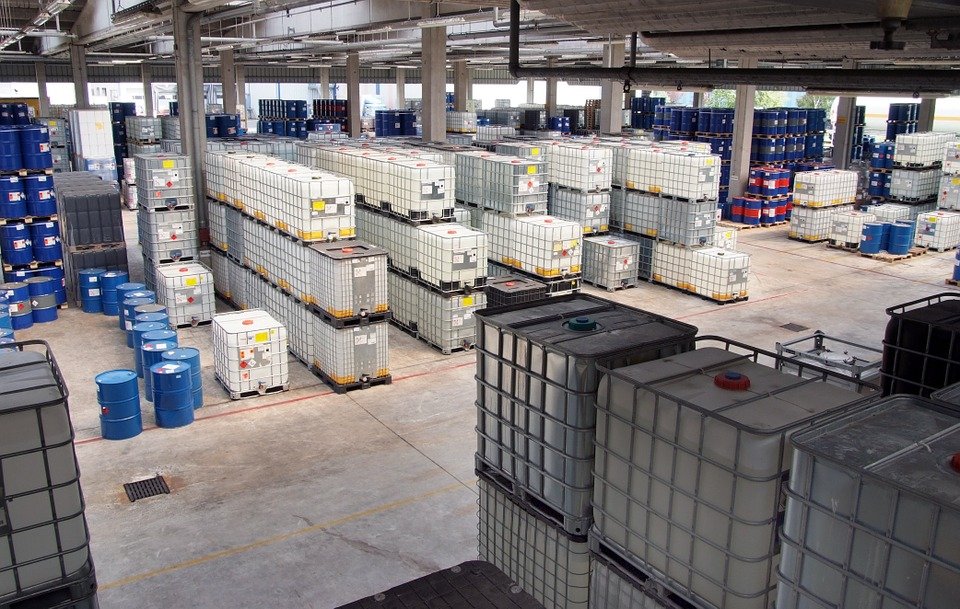What Are Spill Pallets And Where Would You Need Them?

If your industry involves dealing with hazardous chemicals, you no doubt understand the importance of correct storage. Even when best practices are followed, spills and leaks are an inherent risk, and accidents do happen.
When a leak or spill does occur, spill pallets help mitigate the risk to both your workers and the surrounding environment. In this article, we’ll look at exactly what spill pallets are, why you need them and how they can benefit your business.
What are spill pallets?
A spill pallet, also called a containment pallet, is a type of spill containment system. They are heavy-duty pallets with a built-in sump capacity to contain spilled liquids. Spill pallets come in a range of configurations and hold various combinations of drum, IBC and other types of storage containers. The liquid containers sit on top of a grate that forms the top of the pallet. Any leaking, spilled or overflowing liquid drips through the grate and is contained in the body of the pallet. Ecospill spill pallets are fitted with drainage plugs that allow easy recovery of spilled liquids.
What is the purpose of spill pallets?
The primary purpose of spill pallets is to aid in the storage of hazardous chemicals and substances that if leaked, would pose a threat to humans and the environment. Spill pallets prevent dangerous substances from affecting the environment by containing leaks and spills at the source.
What industries use spill pallets?
Spill pallets are especially useful for the following industries:
- Oil and mining
- Service stations
- Hospitals
- Food and beverage
- Farms
- Mechanics
- Construction
Does my business need spill pallets?
Spill pallets are a necessary component of any business that uses or stores chemicals, fuels, oils or any other liquid that can damage the environment. The Environmental Protection Authority (EPA) enforces strict policies across Australia regarding the storage of hazardous substances. In many circumstances, the EPA mandates the use of secondary containment systems such as spill pallets when storing liquid substances. Non-compliance can result in heavy fines for businesses and individuals and loss of licenses.
Furthermore, there are workplace safety laws that regulate the handling of hazardous chemicals. Safe Work Australia developed the model work health and safety (WHS) laws that most jurisdictions across Australia now enforce. Section 357 of their Model Work Health and Safety Regulations provides guidelines for containing and managing spills:
Model Work Health and Safety Regulations (January 2021)
Section 357 Containing and managing spills
“(1) A person conducting a business or undertaking at a workplace must ensure, so far as is reasonably practicable, that where there is a risk from a spill or leak of a hazardous chemical in a solid or liquid form, provision is made in each part of the workplace where the hazardous chemical is used, handled, generated or stored for a spill containment system that contains within the workplace any part of the hazardous chemical that spills or leaks and any resulting effluent.”
Failure to adhere has a maximum fine of $30,000 for companies and $6,000 for individuals. Part 2 carries the same fine and states:
“(2) The person must ensure that the spill containment system does not create a hazard by bringing together different hazardous chemicals that are not compatible.”
Using spill pallets can help you abide by these regulations and maintain a safe workplace. Ecospill is a leading supplier of spill kits and environmental safety products. Talk to our experts to find a spill containment solution to meet your specific needs.
Benefits of using spill pallets
The main benefits of using spill pallets are:
1. Assurance that you comply with laws
Using spill pallets helps ensure compliance with Australia’s rigid workplace and environmental safety regulations. Ecospill containment pallets are EPA compliant, so you can be confident that your business is meeting regulatory requirements.
2. Reduce risk to staff
When spills and leaks inevitably occur, they are safely contained within the pallet’s inbuilt sump and can be drained via the draining plug at the bottom of the pallet. This lessens the risk of employees coming into contact with hazardous liquids and helps create safer work environments.
3. Reduces harm environmental harm
Spill pallets don’t give hazardous substances a chance to escape into the environment. This prevents damage to the environment ensures that surrounding areas are protected.
4. Manage leaks as they occur
If a leak occurs outside of business hours, a spill pallet is there to contain it. You can go home rest assured that you won’t be called back to the workplace in the middle of the night or face a big clean-up first thing in the morning.
5. Saves time
Cleaning up a hazardous spill is time-consuming and disrupts workflow. By collecting spillage, spill pallets dissipate lengthy cleanups and lost work time.
6. Safer transportation
Using spill pallets reduces the common perils of spillage occurring during transportation. Ecospill spill pallets have forklift pockets that enable safe transportation with forklifts and pallet trucks.
7. Easy to clean
Our spill pallets are made from polyethylene or galvanised steel. Both materials are easy to clean and sterilise and neither absorbs liquid.
8. Reusable
HDPE is durable, resistant to chemicals and able to withstand exposure to high and low temperatures. As a result, they are cost-effective and suitable for repeated use.
9. Recyclable
Our 100 per cent polyethylene spill pallets can be recycled making them even more environmentally friendly.
10. Saves money
Implementing spill pallets into your workplace not only protects staff and the environment but also saves you money. All points mentioned above can reduce your costs and in turn help raise your ROI.
For more advice or to discuss your particular spill pallet requirements, please call 1 300 736 116 or contact us for assistance.
